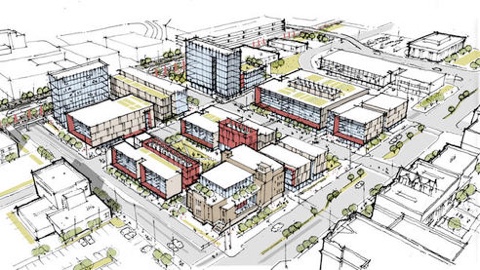
With over a dozen initiatives currently in place to promote a smarter community, awards from Bloomberg Philanthropies and the Kauffman Foundation and a new partnership with US Ignite, Albuquerque has quickly become a smart city to watch.
And for good reason. Its leaders are moving quickly with focus on infrastructure, the use of open data, and the adoption of innovative technologies. After speaking with Chief Information Officer Peter Ambs, it became clear: while technology is how it all happens, the more important reason for Albuquerque’s impressive growth is its leaders.
“Our mayor is really out in front with developing entrepreneurial and smart city initiatives,” Ambs said. “We want to be preparing for the future.”
Thoughtful leadership is what laid the groundwork for one of its most outstanding plans, Innovate ABQ, which will attract and nurture top talent to an entrepreneurial hub and business incubator downtown. This investment in the health of technological growth and innovation not only supports a smarter city but also a more collaborative one with a stronger-than-ever university offering.
Additionally, and to further complement the Innovate ABQ program, its recent partnership with US Ignite and the Smart Gigabit Cities program will enable broadband coverage within a year across the downtown area. Developers and technologists will have access to a high speed, low latency network spanning the ten-mile rapid transit bus route.
It wasn’t always easy. “Everyone wants it, and we can’t wait for Google Fiber to arrive. We don’t own our own electrical utility to have the infrastructure in place, so our fundamental challenge was in getting community partners on board to participate,” said Ambs, reflecting on the beginnings of the project. “Now, we’re working with The University of New Mexico to obtain broadband services and also with some smaller, less traditional sources.”
Free WiFi is already available to community members at more than 50 hot spots throughout town and on all rapid transit bus routes.
Perhaps it’s an interest in collaboration – having seen its influence first hand with the Innovate ABQ and Smart Gigabit Cities projects – that led Ambs to accept an invitation to join the Smart Cities Connect (SCC) advisory committee. With SCC, we are establishing the first city-only group of thought leaders and decision makers to solve smart city challenges together, securely and transparently. Advisory members help steer that direction.
“This group – this consortium – of city leaders established through Smart Cities Connect is working together, sharing ideas, challenges and successes so we can all grow at somewhat the same pace. I haven’t seen it anywhere else. It’s really a watershed moment,” said Ambs.
In addition to its work with partners near and far, Albuquerque leaders have also paved the way with updates to improve their own tools for governance over the 19 city departments that provide services, create economic development, and reinforce programs.
“I work to ensure that we have a technology plan in place to match the needs of the city and that we’re preparing the platforms and the infrastructure to support smart city initiatives inside and outside of City Hall,” said Ambs. “What I mean by that is optimizing the technology, applications and businesses processes for our citizens that match the built environment.”
Residents can order and track permits easily online – from zoning and construction to trade and business registrations. They can also use smart phone applications to find in-the-moment bus information and report non-emergency crimes. Soon, they will even be able to pay for parking. The results? Improved quality of life for citizens and significant efficiency gains for the government.
With a mature open data program, Albuquerque already implements sensor-based technology and the parallel networks that collect data. One of its newest programs, recently funded, relates to LED lighting and the data collection from lighting poles.
“With more information, we can improve our services,” Ambs says. “We will have the ability to use lighting poles and features on a network for data collection or providing services, the least of which might be illumination.”
The city will install up to 75,000 smart city capable nodes for the LED lighting project but is also looking ahead to expand sensor capabilities for air quality, soil moisture, waste bins and more.
To say that Albuquerque is ahead of the curve is an understatement. Even more importantly, its city leaders are making personnel, time, and financial investments that will secure the future of the community and its citizens in the next technological generation.
Learn more about Albuquerque’s smart city initiatives on their website smart.cabq.gov, or ask more on Twitter @cabq.


